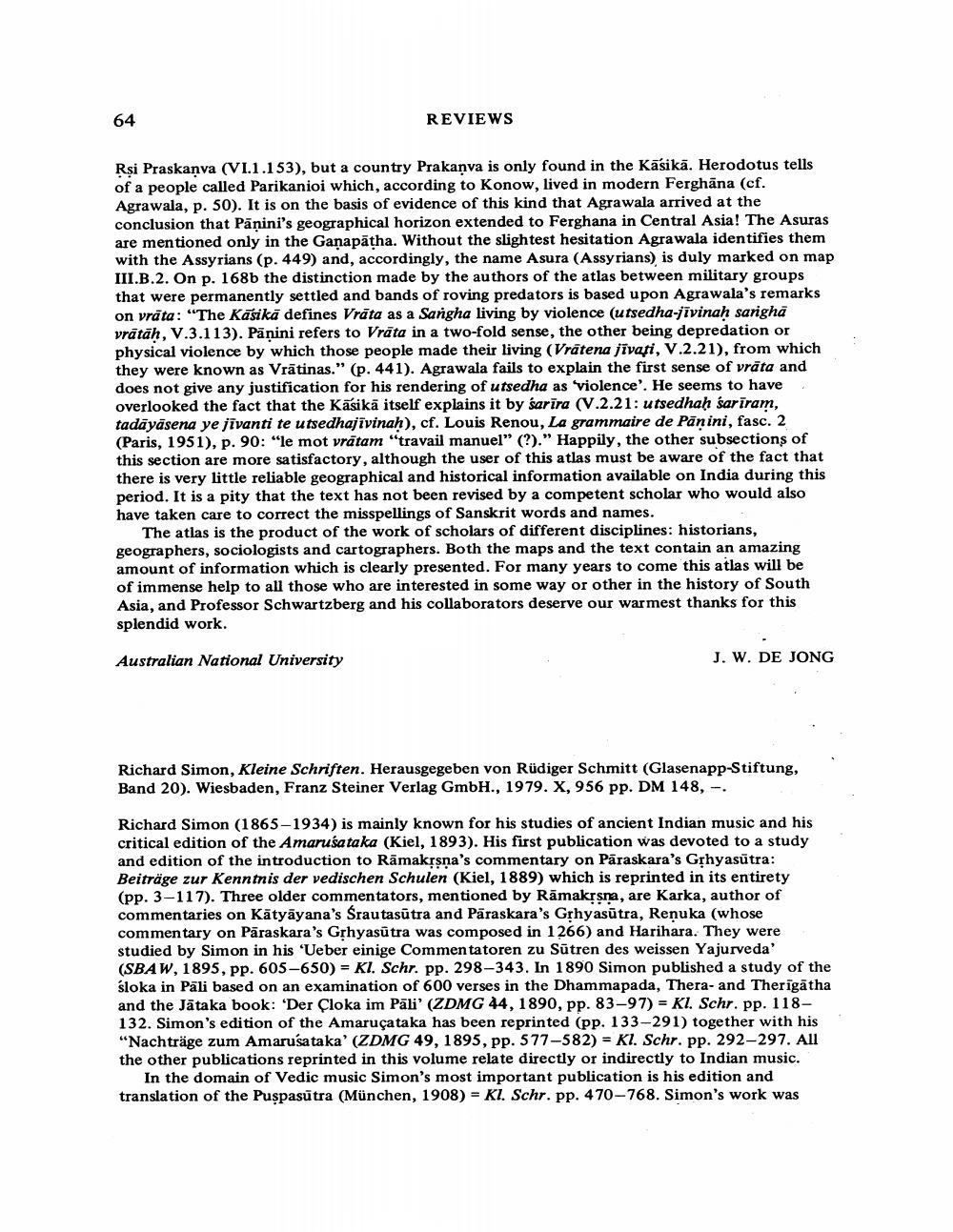Book Title: Book Reviews Author(s): J W De Jong Publisher: J W De Jong View full book textPage 6
________________ 64 REVIEWS Rsi Praskanva (VI.1.153), but a country Prakanva is only found in the Kāśikā. Herodotus tells of a people called Parikanioi which, according to Konow, lived in modern Ferghāna (cf. Agrawala, p. 50). It is on the basis of evidence of this kind that Agrawala arrived at the conclusion that Pāṇini's geographical horizon extended to Ferghana in Central Asia! The Asuras are mentioned only in the Ganapatha. Without the slightest hesitation Agrawala identifies them with the Assyrians (p. 449) and, accordingly, the name Asura (Assyrians) is duly marked on map III.B.2. On p. 168b the distinction made by the authors of the atlas between military groups that were permanently settled and bands of roving predators is based upon Agrawala's remarks on vrăta: "The Kašikā defines Vrāta as a Sangha living by violence (utsedha-jīvinah sarigha vrátah, V.3.113). Pāṇini refers to Vrata in a two-fold sense, the other being depredation or physical violence by which those people made their living (Vrátena jīvati, V.2.21), from which they were known as Vrātinas.” (p. 441). Agrawala fails to explain the first sense of vräta and does not give any justification for his rendering of utsedha as violence'. He seems to have overlooked the fact that the Kasikā itself explains it by sarīra (V.2.21: utsedhah sariram, tadāyāsena ye jīvanti te utsedhajivinah), cf. Louis Renou, La grammaire de Pānini, fasc. 2 (Paris, 1951), p. 90: "le mot vrätam "travail manuel" (?)." Happily, the other subsections of this section are more satisfactory, although the user of this atlas must be aware of the fact that there is very little reliable geographical and historical information available on India during this period. It is a pity that the text has not been revised by a competent scholar who would also have taken care to correct the misspellings of Sanskrit words and names. The atlas is the product of the work of scholars of different disciplines: historians, geographers, sociologists and cartographers. Both the maps and the text contain an amazing amount of information which is clearly presented. For many years to come this atlas will be of immense help to all those who are interested in some way or other in the history of South Asia, and Professor Schwartzberg and his collaborators deserve our warmest thanks for this splendid work. Australian National University J. W. DE JONG Richard Simon, Kleine Schriften. Herausgegeben von Rüdiger Schmitt (Glasenapp-Stiftung, Band 20). Wiesbaden, Franz Steiner Verlag GmbH., 1979. X, 956 pp. DM 148, Richard Simon (1865-1934) is mainly known for his studies of ancient Indian music and his critical edition of the Amaruša taka (Kiel, 1893). His first publication was devoted to a study and edition of the introduction to Rāmakrsna's commentary on Paraskara's Gịhyasūtra: Beiträge zur Kenntnis der vedischen Schulen (Kiel, 1889) which is reprinted in its entirety (pp. 3-117). Three older commentators, mentioned by Rāmakrsna, are Karka, author of commentaries on Kätyāyana's Srautasūtra and Paraskara's Grhyasūtra, Renuka (whose commentary on Pāraskara's Grhyasūtra was composed in 1266) and Harihara. They were studied by Simon in his 'Ueber einige Commentatoren zu Sūtren des weissen Yajurveda' (SBAW, 1895, pp. 605-650) = Kl. Schr. pp. 298-343. In 1890 Simon published a study of the śloka in Pali based on an examination of 600 verses in the Dhammapada, Thera- and Therigātha and the Jātaka book: 'Der Cloka im Pali' (ZDMG 44, 1890, pp. 83-97) = Kl. Schr. pp. 118132. Simon's edition of the Amaruçataka has been reprinted (pp. 133-291) together with his "Nachträge zum Amarusataka' (ZDMG 49, 1895, pp. 577-582) = Kl. Schr. pp. 292-297. All the other publications reprinted in this volume relate directly or indirectly to Indian music. In the domain of Vedic music Simon's most important publication is his edition and translation of the Puspasūtra (München, 1908) = Kl. Schr. pp. 470-768. Simon's work wasPage Navigation
1 ... 4 5 6 7 8 9 10 11 12 13 14 15 16 17 18 19 20 21 22 23 24 25 26 27 28 29 30 31 32 33 34 35 36 37 38 39
